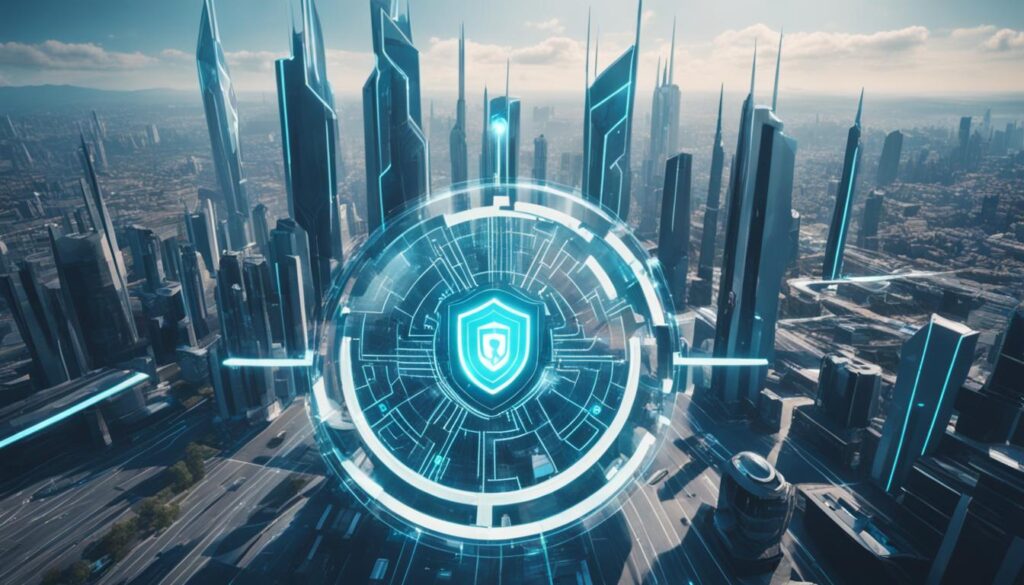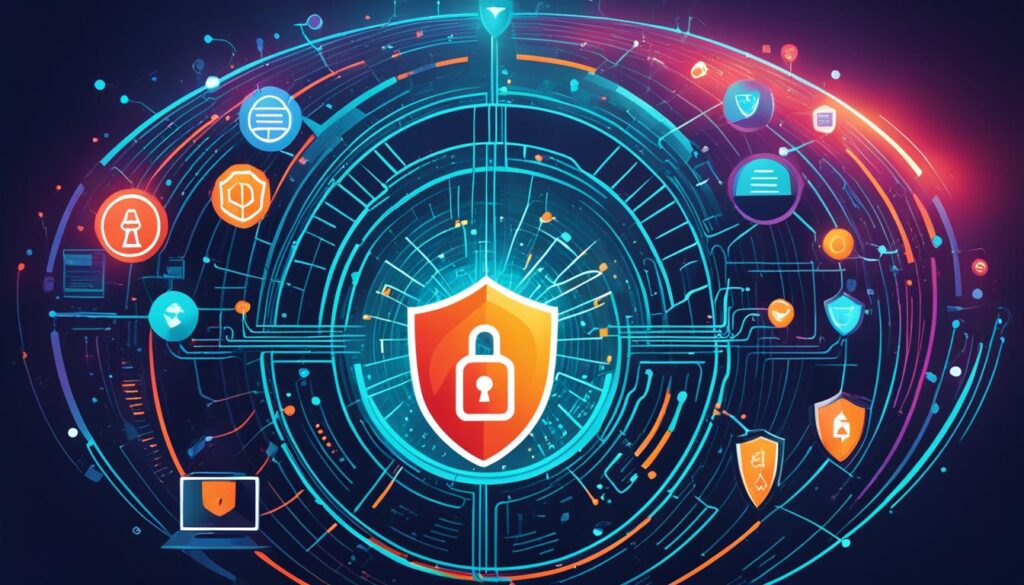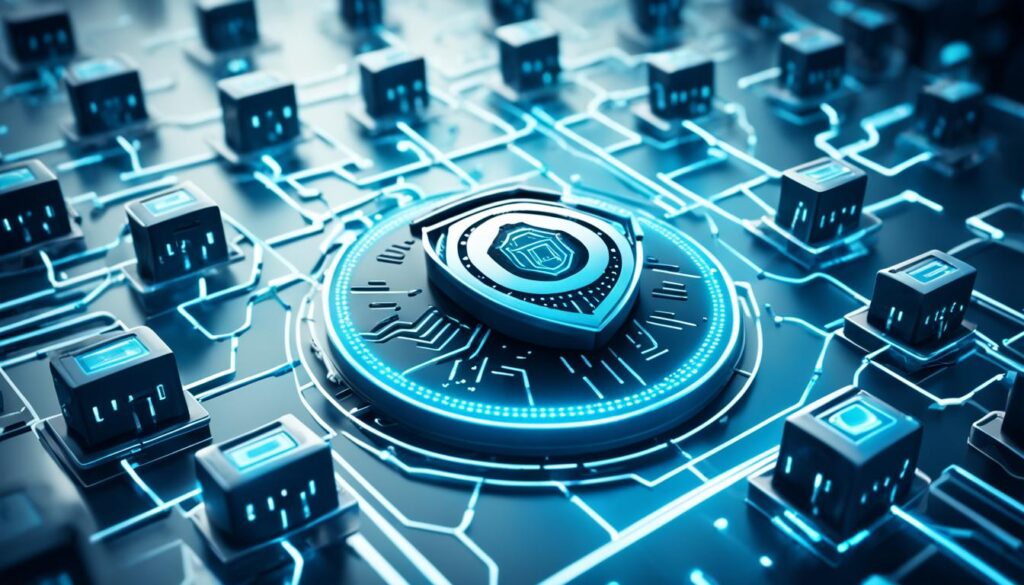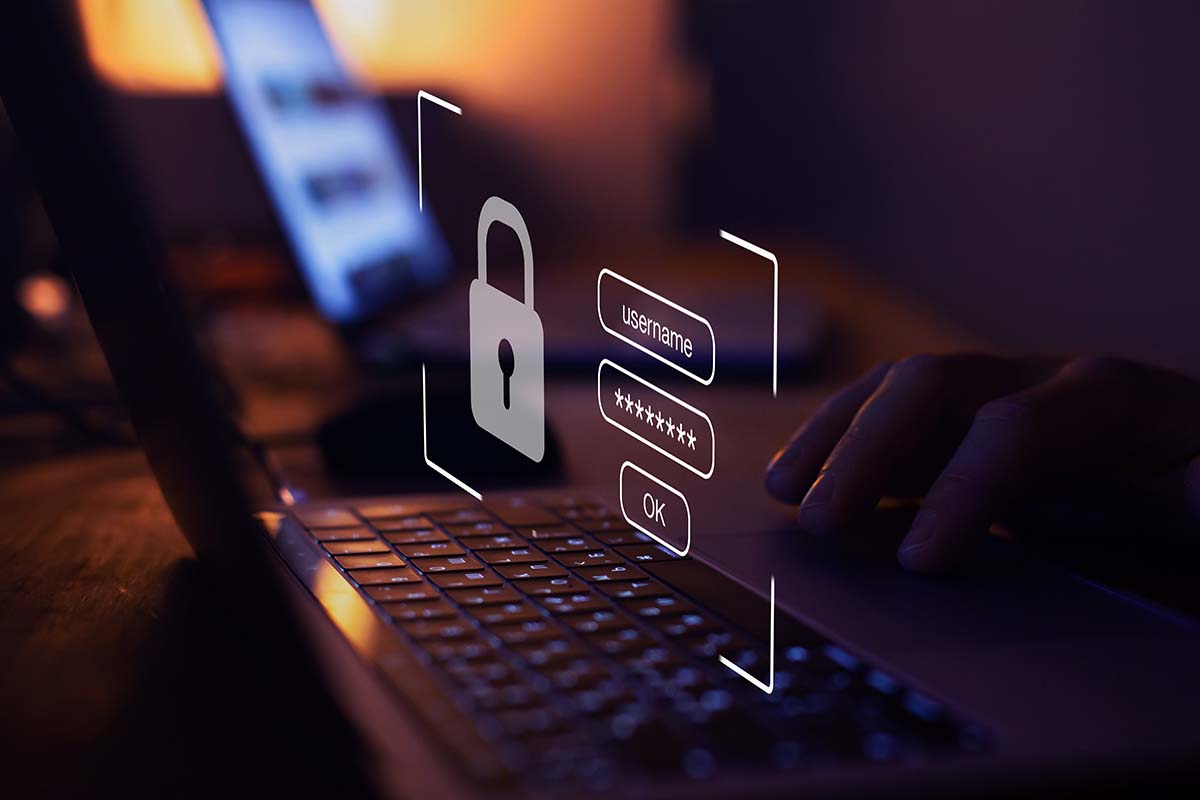Why AI is the Future of Cybersecurity? 2025
Today, everything is connected digitally, which means the cybersecurity field is changing quickly. Old ways of protecting us from cyber threats are not enough anymore. We now need smart, innovative solutions, and AI is key to this.
AI is changing how we deal with cyber attacks. Using techniques like machine learning, it can learn and predict threats before they happen, strengthening and smartening our defenses. AI is not just a tool; it’s the future of protecting us online.
This article will show you how AI is making big changes in cybersecurity. We will talk about how AI helps detect threats better, responds faster, and learns on its own. These abilities are transforming how we keep our digital spaces safe.
Ready to learn why AI is the next big thing in cybersecurity? Let’s explore how this amazing tech will shape our future security efforts.
Key Takeaways
- AI-powered technologies are revolutionizing the cybersecurity landscape, offering more scalable, adaptable, and intelligent security solutions.
- Machine learning and predictive analytics enable AI-driven systems to detect and respond to cyber threats more effectively than traditional approaches.
- Automated incident response and self-learning security models empower organizations to stay ahead of evolving cyber threats.
- AI-enabled threat intelligence and data-driven security analytics provide deeper insights and proactive defense strategies.
- The integration of AI in cybersecurity is crucial for maintaining cyber resilience and safeguarding critical data and infrastructure in the digital age.

The Cybersecurity Landscape and the Need for AI
The world of cybersecurity is always growing, with new threats popping up fast. Cybercriminals are getting smarter, using AI and machine learning for sneakier attacks. Because of this, organizations need better security measures to stay safe.
Read More: What is Cybersecurity? Types, Threats, and Cyber Safety Tips
Evolving Cyber Threats and Vulnerabilities
Artificial intelligence and generative AI have changed how hackers plan their moves. Now, skilled hackers can dodge normal security with the help of AI threat detection and predictive security analytics. These tactics make it hard to spot and stop their attacks, making them a big challenge.
Limitations of Traditional Cybersecurity Approaches
Old ways of fighting cybercrime, like rule-based detection and manual responses, need to catch up. They need help to keep up with new threats or work alone. Because of this, organizations are struggling to stay protected. They urgently need help from AI for better threat intelligence and smarter defenses.
Read More: Different Types of Cyber Security: A Comprehensive Guide
How AI is Transforming Cybersecurity
AI is changing how we secure our digital world. It brings smarter and more proactive security solutions, mainly through machine learning for threat detection. Thanks to advanced algorithms, AI can process large amounts of data, spotting unusual patterns.
This leads to better and faster threat detection. It empowers organizations to react swiftly against potential cyber-attacks.
Read More: Can AI Replace Cybersecurity?
Machine Learning for Threat Detection
Machine learning finds hidden dangers by analyzing big datasets. It examines things like network logs and user behaviors, finding threats traditional methods often overlook.
This boosts our capability to spot and act on complex threats almost as they happen.
Predictive Analytics and Automated Response
AI also brings predictive analytics and automatic responses into cybersecurity. By looking at past data and threats today, it anticipates attacks. This leads to setting up defenses early and responding automatically to incidents.

AI-Powered Threat Intelligence
AI is also changing threat intelligence. It can gather large amounts of data from various sources and analyze it to offer fresh and useful threat insights.
These AI-based insights help shape better security strategies and manage risks. It’s a big leap forward in cyber defense.
By using AI, businesses can maintain better security. They can act before cyber attacks happen, improving their resilience against evolving threats.
Read More: How is AI used in cyber security?
Benefits of AI in Cybersecurity
Integrating artificial intelligence (AI) into cybersecurity is very helpful. It boosts an organization’s security level in many ways. It enhances the discovery and prevention of threats and improves the speed of issue fixing.
Improved Threat Detection and Prevention
AI security tools analyze huge amounts of data from many sources, including network use, user behavior, and security records. They spot odd patterns and risks early, stopping attacks before much damage is done. These tools use advanced tech like predictive patterns, neural networks, and deep learning to find and stop advanced threats.
Enhanced Incident Response and Remediation
When a cyber-attack occurs, AI also helps tackle the issue. It can quickly determine what’s been affected and how bad the attack is. Then, it starts fixing the issue and stopping it from spreading further. This saves a lot of time and effort, making the recovery phase less damaging.
Why AI is the Future of Cybersecurity?
AI is set to take over the world of cybersecurity. It brings with it the power to grow, change, and learn constantly. While traditional security methods can lag, AI keeps up with the increasing cyber threats. This happens because AI can adapt and grow efficiently to counter these threats.
Read More: Why is Cyber Security Important for Modern Business Safety?
Scalability and Adaptability
AI in cybersecurity is flexible and can grow with the danger level. AI systems use sophisticated learning algorithms to assess huge amounts of data. They look at things like network activity, user behavior, and security logs to spot unusual patterns. Finding these, AI signals threats early, helping organizations act quickly. This can stop cyber-attacks before they happen.
Continuous Learning and Improvement
AI stands out in cybersecurity for always getting better. While old security methods stick to known threats, AI learns from new ones. It gets smarter by analyzing more data and facing different cyberattack scenarios. This ongoing learning not only improves detection but also response to threats. So, AI remains effective against the newest dangers in cybersecurity.
Challenges and Considerations
AI in cybersecurity brings a lot of hope, but there are hurdles, too. A big issue is getting the right data for AI to work well. This data is needed to make AI security tools effective.
Wrong or incomplete data can cause AI to miss threats, making organizations more vulnerable. It’s key to work on getting the best data for AI tools, which makes them more reliable and protects them better.
Data Quality and Availability
AI in cybersecurity needs to learn a lot of different kinds of data. Yet, not all places can easily gather good, correct data, making AI tools less able to find and stop new threats.
Without solid data, AI tools might not spot all dangers, which could make organizations’ lives more risky.
Ethical Concerns and Bias
The role of AI in keeping us safe online also raises concerns about fairness and ethics. There’s a fear that AI might make unfair decisions if the data it’s trained on is biased. This is a big issue that requires careful handling.
To avoid these problems, companies and groups need clear rules for using AI fairly. This will ensure that AI acts justly and helps without hurting anyone.
Integration and Adoption Barriers
Adding AI security to current systems can be tough. Old systems, different data storage, and a lack of desire to change can slow this down. Plus, not all organizations have the experts or money for AI security tools.
These challenges are even harder for smaller groups, which may need help using AI in their security systems.

Real-World Applications and Use Cases
AI-powered cybersecurity is making big changes in the real world. Take Ark Solver, for example, a top AI cybersecurity provider. Their tools use smart algorithms to fight off cyber threats automatically, predict issues before they happen, and make security tasks easier.
Ark Solver’s AI-Powered Cybersecurity Solutions
Ark Solver is at the forefront of AI cybersecurity, using neural networks and deep learning. This setup defends against a broad range of cyber threats. It can find and fix vulnerabilities early before hackers use them. Ark Solver’s smart tools also speed up how security teams handle problems.
Success Stories and Industry Examples
In finance, Ark Solver’s AI has boosted cyber protection for banks and fintech firms. Their tech makes it hard for financial crimes to happen. In healthcare, Ark Solver secures patient info and medical tech from cyber threats. Their use of AI has made these areas safer.
Ark Solver’s work protecting governments and big tech has been key. They use big data analytics and smart security models to protect against even the most advanced cyber attacks. The tech industry really respects what Ark Solver is doing.
Read More: Is Cyber Security Expensive? Cost Insights Revealed
Conclusion
As cybersecurity keeps changing, AI is set to be its future. It will use machine learning, predictive analytics, and automated response. This will make security more scalable, adaptable, and smarter against cyber threats.
AI brings self-learning security models and smart security algorithms. It means automated threat detection, predictive threat analysis, and intelligent security systems. They can change and adjust to new threats. AI-powered threat detection and AI cybersecurity solutions will change how we use machine learning for cybersecurity and AI-driven security analytics.
As AI and cybersecurity trends come together, companies must use AI-enabled threat intelligence and AI cybersecurity strategies. This helps them lead the way. Using AI for cyber risk management and predictive analytics security makes businesses stronger. It helps them fight off new deep learning cybersecurity and cognitive security threats.
FAQ
What are the benefits of AI in cybersecurity?
AI helps in cybersecurity by better spotting and stopping threats. It also makes responses to incidents faster and more effective. Also, it grows and learns on its own to keep improving security measures.
How does AI-powered threat detection work?
AI threat detection uses complex algorithms to analyze large amounts of data. It examines things like how people act online and network traffic. By spotting unusual patterns, it can detect threats before they occur.
What are the challenges in implementing AI in cybersecurity?
Introducing AI into cybersecurity faces a few hurdles. It needs a lot of good data to learn properly. There are also worries about its fairness and credibility. Plus, only some organizations can easily start using AI technology.
How is AI transforming the cybersecurity landscape?
AI is changing how we keep computer systems and data safe. It lets us find threats better and earlier. It also helps predict challenges, react automatically, and get smarter about how threats work. This keeps us a step ahead in fighting cyber dangers.
What are some real-world applications and use cases of AI in cybersecurity?
Companies like Ark Solver are using AI for better security. Their products use high-tech learning to find and handle threats, including spotting, responding to, and automating security tasks.
Why is AI considered the future of cybersecurity?
AI’s future in cybersecurity looks bright because it can adapt and learn continuously. It is built to grow with the changes and challenges in keeping our digital world safe. This flexibility and learning are key in a constantly changing world.






